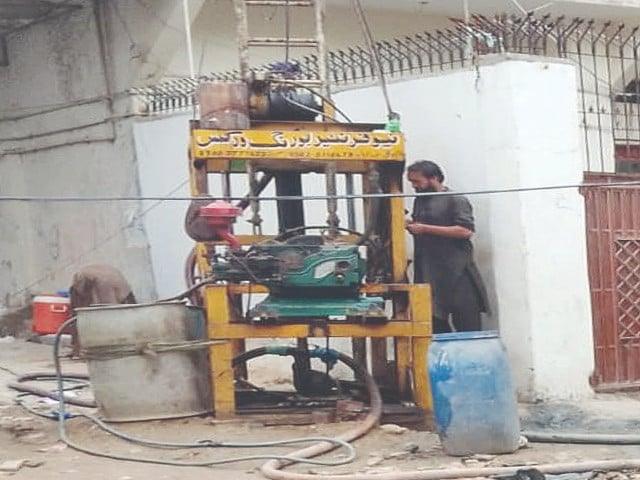Karachi:
In the midst of the city’s endless water crisis, groundwater has become a crucial way to supply the need for survival. However, popular practice has been the subject of scrutiny as experts discuss their correlation with an unprecedented increase in earthquakes that hit Karachi.
According to the chief meteorologist Ameer Haider Laghari, since June 1, the areas in the eastern part of Karachi, including Landhi, Malir, Korangi and Quaidabad, have experienced 57 tremors with magnitudes ranging from 1.5 to 3.8 on the Richter scale. Although these tremors were lower, their frequency has caused significant fear and anxiety among residents.
In these areas, the extraction of groundwater through boredom has increased significantly over the years as a result of which the earth in these areas has decreased. While there is no scientific evidence that directly links recent earthquakes and the sinking of the Earth with boring and construction activity, it is a hypothesis that requires comprehensive study.
Dr. Adnan Khan of the Department of Geology of the University of Karachi explained that in many areas of Karachi, particularly Landhi, Korangi and Malir, the lack of a regular water supply system had led residents, industries and plants of ro to depend largely on the extraction of groundwater. “The land in areas such as Landhi, Korangi, Malir, Defense and North Karachi has decreased by 15 centimeters and is sinking at an annual rate of 1.5 centimeters,” Dr. Khan revealed.
Dr. Nauman Ahmed, a professor at the University of NED, said that, although the earthquakes occurred on a large scale and could not be definitely linked to boring and excessive extraction of groundwater was an anti -native process, therefore, the areas where the boring prevails have probably developed weakened underground structures.
“As the water is extracted under the surface, a void is created, which makes the natural underground position vulnerable, weakening the foundations of the houses. These factors increase the risk of structural damage in these areas during earthquakes or in another way,” said Dr. Ahmed, who urged the government to conduct a detailed survey of the affected areas, identifying the damage caused by the boring situation.
“Scientific research suggests that the movement of tectonic plates in local failures is causing the sinking of the Earth. However, it is under observation that excessive extraction of groundwater occurs in areas such as Landhi, Malir and Korangi, where earthquakes are also being recorded, and the earth is sinking. A detailed study is required to determine the exact cause,” the Dr. added. Khan
Dr. Masood Rafi, president of the Department of Earthquake Engineering of the University of NED, identified two main causes of land sinking in Karachi: the construction of small and large buildings and the extensive use of groundwater.
“Due to the water crisis in many areas, residents have resorted to alternative methods, such as boredom, to extract groundwater. In addition, reverse osmosis (ro) plants have been established in many locations for drinking water, exacerbating the exhaustion of underground reserves and creating gaps under the surface. Water extraction to avoid additional damage,” Dr. Rafi said.
On the other hand, Dr. Khan warned that although Karachi’s local failures were not very dangerous, the city was at risk of surrounding tectonic plates, especially those of India and Baluchistan.
“Strong earthquakes in these regions could cause destruction through Karachi, which is part of the Indian tectonic plate. About 110 kilometers west of the city are a point where three plates: the Indian, Eurasia and Arab intersection.




